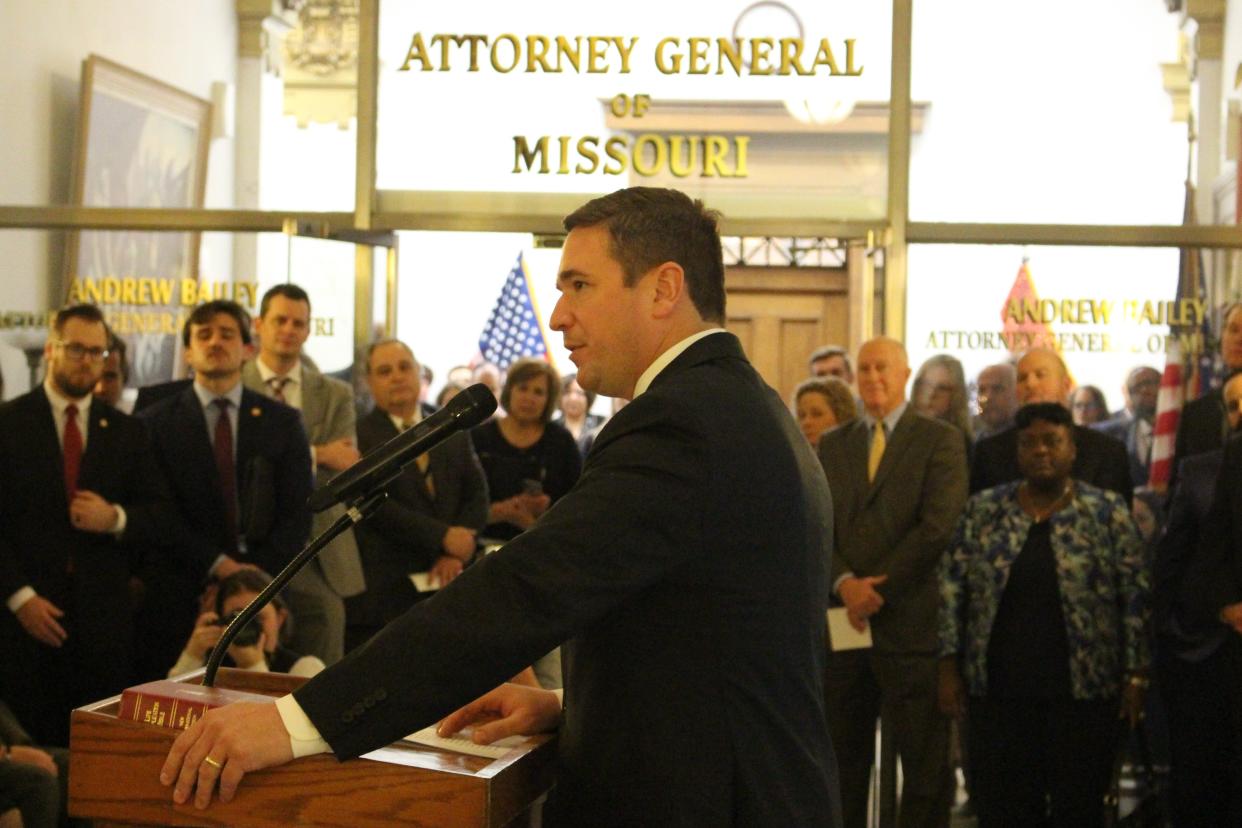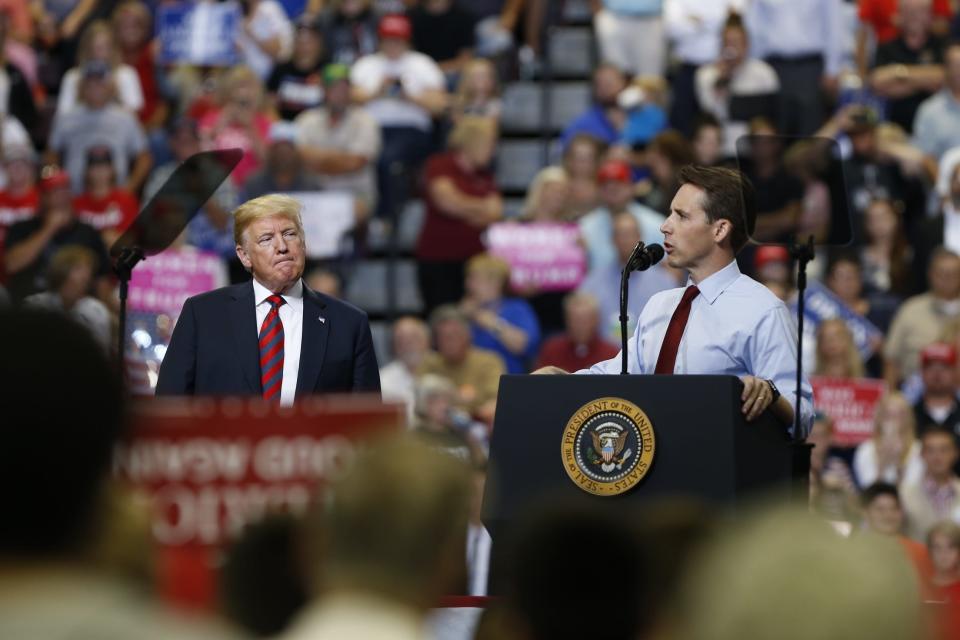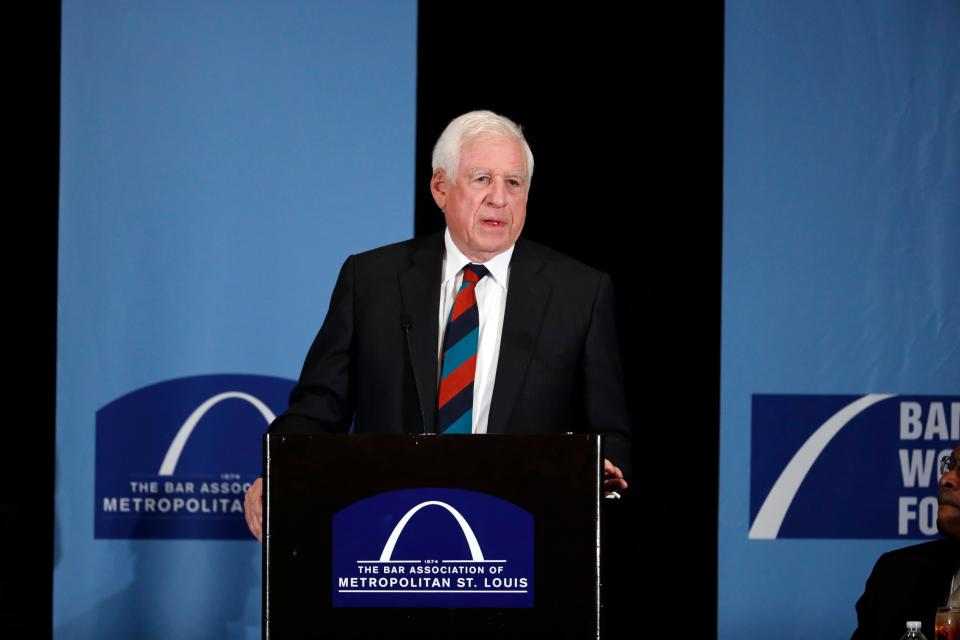Politician or the people's lawyer? How the role of Missouri Attorney General has evolved

- Oops!Something went wrong.Please try again later.
- Oops!Something went wrong.Please try again later.
- Oops!Something went wrong.Please try again later.
On a hot July afternoon, the Missouri Supreme Court handed down a judgment ordering Attorney General Andrew Bailey to approve a fiscal note summary in a case involving abortion ballot initiative measures.
Bailey had withheld approval due to his disagreement with the cost assessment prepared by Auditor Scott Fitzpatrick but the courts ruled the move was outside the scope of his office's authority.
Actions such as this by Bailey and several of his predecessors have led some to question whether the attorney general's office has become more focused on politics than it ought to be.
Former Attorney General Eric Schmitt, now a U.S. Senator, earned a reputation for filing lawsuits against local school districts, along with at least 25 cases his office filed against the federal government.
During U.S. Sen. Josh Hawley’s abbreviated tenure as attorney general prior to Schmitt, he fulfilled his campaign promises to take the federal government to court any time he felt they had overstepped their authority.
Both Schmitt and Hawley did not respond to requests for comments in time for inclusion in this story.
Hawley’s campaign for attorney general coincided with former President Donald Trump’s rise to power in 2016. He was quoted by the Kansas City Star shortly after taking office saying that he planned to help Trump by suing him, in an effort to use the legal action to quickly roll back Obama-era environmental and business policies.

While suing the federal government is nothing new for state attorney generals, the frequency with which these lawsuits have been filed in recent years has increased.
“I think Hawley started this kind of suing the federal government business, that Schmitt then did in larger measure and that Bailey is continuing to do,” said Harvey Tettlebaum, a lawyer who worked under Republican Attorney General John Danforth from 1969 to 1976. “But that's a national trend. That's not just a local trend.”
In fact, many of the federal lawsuits that Hawley, Schmitt and Bailey have been involved with were part of a multi-state coalition of attorney generals. For example, Schmitt was one of 10 attorney generals to bring suit against the Biden administration’s Covid-19 vaccine mandates.

“When you look at attorney generals across the rest of the nation, both Republicans and Democrats, you see far more aggressive actions to sort of insert themselves into partisan politics in a way that that didn't used to be the case a generation ago,” said Peverill Squire, a political science professor at the University of Missouri.
Bailey contests claims that his actions were taken in the interest of playing partisan politics.
"I’m motivated by one thing: doing the right thing for the right reasons," Bailey said. "In this role, that looks like maximizing the legal authority granted to the AG’s office to protect the people of Missouri and their constitutional rights."
What exactly is the role of the Missouri Attorney General?
Missouri has had an attorney general since 1806, while it was still part of the Louisiana Territory prior to being established as an individual state. Since the 1865 state constitution, it has been an elected position.
The Missouri Attorney General can represent the legal interests of the state or its people, though individual people cannot be represented in private legal actions. It is the responsibility of the office to represent the state in all appeals cases involving felony criminal charges.
As the state’s attorney, the office of the attorney general represents the state’s interests in civil suits and any other matters of interest to the state, including consumer protection and environmental laws.
It also has the power to institute quo warranto proceedings capable of ousting businesses guilty of misconduct from the state and removing politicians from office for wrongdoing.
Bailey has described the role as maximizing "the legal authority granted to the Attorney General’s Office to protect the people of Missouri and their constitutional rights."
Although the responsibilities of the office are apolitical, it is an office that must be won through the popular vote, meaning that the winning candidate must campaign.
“You can't get there without winning a statewide election and being involved in party politics,” said Thomas Ringenberg, a political science professor at the University of Kansas.
Additionally, many of the former attorney generals have launched successful political careers after holding that office. Schmitt and Hawley, who now represent Missouri in the U.S. Senate, are the most recent examples.
“Our statewide elected offices are, for a lot of folks, the springboard for hopefully being a governor or senator or even something beyond that,” Ringenberg said.
With that comes the need to establish a strong track record while in office for use in campaigning for future political positions, both statewide and national, some political experts say.
“As in other states, the office of the attorney general has become a partisan tool to use against the national presidential administration,” Squire said. “Democratic attorney generals used it against the Trump administration, and Republicans have certainly been quite active in trying to use it against the Biden administration.”
While former President Trump was in office, at least 156 multi-state lawsuits were filed against his administration. That’s more than three times as many as were filed during the eight years of the Obama administration, when Republican attorney generals brought just 46 multi-state lawsuits.
“It mirrors the more divisive, polarized culture war battles that we've been fighting, especially, but not exclusively, over the last seven or eight years,” said Daniel Ponder, a professor of political science at Drury University.
As of Sept. 2, the Biden administration has faced 68 multi-state lawsuits. Among those, Schmitt involved Missouri in at least 25 before he was elected to the Senate. Bailey has continued Schmitt’s work, finishing up cases that were still being litigated and filing new ones.
“Some of these lawsuits, we just would never have done that,” said Danforth, who served two terms as Missouri Attorney General before he was elected to the U.S. Senate. “I didn't have time to do it.”
More: No Labels push for independent 2024 presidential ticket yields mixed reactions, concerns
The office’s unique position to “do battle with the president”
The nature of the attorney general’s office puts it in a unique position to earn both statewide and national recognition for the cases it tries.
“It's an opportunity to be the voice of the state of Missouri before the Supreme Court and do battle directly with the president,” Ringenberg said.
Bailey counts several such cases among his top achievements while in office so far.
"I’m extremely proud that we obtained an unprecedented court order halting the Biden Administration from violating our right to free speech on social media platforms," Bailey said. "The case is likely to head all the way to the United States Supreme Court, and is undoubtedly the most important First Amendment case in a generation."
Bailey refers to the recently decided Missouri v. Biden case that prohibited government from removing content it deems misinformation from social media platforms. On Friday, an appeals court upheld a significantly narrower version of the prohibition, which has yet to take effect and could be appealed to the U.S. Supreme Court.
Schmitt, like Bailey, declared it a "massive victory for free speech" nonetheless.
"Because of Missouri v. Biden, the federal government is prohibited yet again from colluding with social media giants to censor freedom of speech online," Schmitt said in a statement. "I’m proud to have filed Missouri v. Biden when I was Missouri’s Attorney General, and I will continue to fight for freedom of speech here in the Senate.”
Another case started by Schmitt and continued by Bailey when he took office shot down the Biden administration's student loan forgiveness program.

"We landed a massive win at the United States Supreme Court halting Biden’s unlawful student loan plan that would have cost Missouri taxpayers $44 million," Bailey said.
However, experts see one drawback to Missouri’s continued involvement in these lawsuits — the attorney general’s office is, like any other branch of state government, funded by the taxpayers.
Schmitt became well known for bringing lawsuits against school districts and other local entities for imposing COVID-19 restrictions and other matters, a part of his platform in his Senate campaign.
“During the pandemic, Schmitt lost a lot of those lawsuits and it cost the state of Missouri money,” Ringenberg said.
These lawsuits continue to cost taxpayer money, even though Missouri would still have to abide by the judgments of these federal cases, whether they were involved or not.
This was a major factor in former Missouri Attorney General Chris Koster’s decision not to join other state attorney generals or former Lt. Gov. Peter Kinder in lawsuits disputing the Affordable Care Act in 2010, although he did file two amicus briefs in support of the lawsuits.
Koster, a Democrat, did bring other charges against the federal government, including two in 2015. One was against the USDA for denying an extension on crop insurance for farmers and another against the EPA for imposing carbon emission restrictions.
More: Education advocates cite Missouri as a top battleground in fight over public schools
Reflections on earlier days in the attorney general’s office
Some political experts think the everyday responsibilities of the attorney general’s office are sometimes overlooked while the more polarizing cases draw public attention.
“A lot of the things that we've seen with the last three attorneys generals seem to be very political,” Ringenberg said. “I think they're doing other things, but it's just kind of where the light gets attracted to.”
Just last week, Bailey brought charges against a Nixa-based contractor who had reportedly scammed Missourians. His office also recently assisted Henry County authorities in sentencing a man who killed a police officer.
"We’ve received more requests to assist with prosecutions across the state than any time in recent history," Bailey said. "In partnership with the Henry County Prosecuting Attorney, we obtained a sentence of life without parole for a man who murdered a police officer. As a former prosecutor myself, I’m committed to partnering with local prosecutors and law enforcement to obtain justice for victims and put the bad guys away."
Bailey has also returned more than $4 million in restitution to Missourians who were victims of consumer fraud through the office's Consumer Protection Division. His office joined with other attorney generals to stop a Texas robocalling center from blasting Missourians with spam calls.
These are the kind of cases some political experts feel exemplify the legacy of former attorney generals' terms.
“It was more focused on state politics and state policies and less on national policies and didn't quite have the partisan edge as it does now,” Squire said.
Danforth, who served as attorney general from 1969 to 1976, recalled his time in office and the standard he felt was set.

“It was a standard of excellence,” Danforth said. “It was a standard of doing the people's business, of professionalism, of creating a really good law office. It was the opposite of just making everything partisan.”
When elected, Danforth was the first Republican to serve as attorney general since 1933, and the only one to hold statewide office in an otherwise Democratic administration.
“We were on a very tight leash with the state legislature,” Danforth said. “As far as the budget was concerned, I had to do an enormous amount of work on a limited budget. The only way to do it was to hire really good young lawyers.”
During his time in office, he brought former Missouri Treasurer Bill Robinson to trial. According to Tettlebaum, who worked in Danforth’s office all eight years, Robinson allegedly was seen accepting a bribe at the now-closed Ramada Inn in Jefferson City.
Although they ultimately lost the case, the evidence presented was covered heavily by the press, which unveiled deeply ingrained corruption in Missouri state politics, leading to subsequent reforms.
“It became very obvious that this was a very corrupt system, and so we were able to get it changed,” Tettlebaum said. “So we lost the battle but we won the war.”
Tettlebaum and Danforth recalled other cases from their time in the office. Tettlebaum told of a years-long undercover operation to ferret out a bootleg liquor ring in the Bootheel, and remove the Missouri sheriff behind it all from office.
Danforth remembers using antitrust law to halt a nationwide trucking strike impeding refueling stations, making Missouri “an oasis for truck transportation in America,” at that time.
“It was the most fun I've had as a lawyer,” Tettlebaum said. “And I’ve had a lot of fun as a lawyer. I’m still practicing after 54 years.”
Overall, Danforth felt that his responsibilities as attorney general came down to just a few points.
“We operated a law office, and our client was the state,” Danforth said. “The objective was to provide a very high level of legal work on a very limited budget, primarily relying on young people who were very good at what they did.”
This article originally appeared on Springfield News-Leader: The changing role of the Missouri Attorney General

